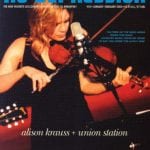Bill Frisell – A new intersection at the crossroads
“You have to do your homework. Those guys like Tony Rice and David Grisman have done their homework, so when they combine bluegrass with something else, they have the knowledge to pull it off. I spent 30 years of my life trying to play Scruggs banjo, while Bill was transcribing all those Monk solos. We both did our homework, but it was in different classrooms. Now we’re exchange students.”
Horvitz’s latest release, Sweeter Than The Day (Songlines), is a piano album with a rhythm section featuring Lowe, Roth and Young. Featuring patient tempos, fetching melodies and lots of open space, it recalls the heyday of ECM Records, a German label that pioneered the pastoral-jazz concept on 1980s albums by Frisell, Pat Metheny, Jan Garbarek, Keith Jarrett, Oregon, and Dave Holland.
“The ballads and waltzes grow out of the work I’ve done with Danny, Robin and Bill,” Horvitz acknowledges, “but it’s not as if I’m consciously trying to fuse country and jazz or anything like that. It’s more that any musician is influenced by the other musicians he works with, and these are the people I’ve worked with most closely recently.
“Whether or not you like the Grateful Dead — and I feel both ways — you can’t imagine them in 1966 saying, ‘Let’s fuse this music with that music.’ No, they’re saying, ‘Hey, Dude, check this record out; maybe we can learn this song.’ When they play a country song, it doesn’t sound like country; it sounds like a rock band that loves country music. The fact that the Byrds were listening to Coltrane and were influenced by him doesn’t mean they sounded like Coltrane.
“The worst thing you can do is try to imitate a music you’re not grounded in; it’s almost always a disaster. When jazz musicians try to play Indian music, for example, it’s almost always terrible. But if a jazz musician who loves Indian music expresses that love through jazz, something new will come in the side door. That’s what we’re doing.”
Holcomb included “Engine 143” and “A Lazy Farmer Boy” on her new album as a result of being invited to participate in a tribute to Harry Smith. Producer Hal Willner called her up out of the blue and asked her to pick two songs from Smith’s Anthology Of American Folk Music for a special concert.
“I knew about the Anthology, but I had never actually heard it,” she says. “When I was going to high school in the hills outside Santa Cruz, I listened to some folk music, but it was all second- or third-generation stuff. I did go on a Civil War jag and learned a lot of those songs, not so much for the historical element as for their harmonic quality, which I really loved.
“After high school, I dropped out of college and moved to North Carolina with a boyfriend to sharecrop tobacco for a couple years. I didn’t hear a lot of live music in the mountains, but I absorbed the feel of the place. People there lived a full-time outdoors farming life, doing everything by hand. Funerals were the big entertainment in the winter. It was a place where a lot of songs seemed to come from, even if these people didn’t play much music.”
“When I met Robin 25 years ago,” Horvitz remembers, “long before she sang in public, she would always sing those songs in the car. I didn’t know what the Harry Smith collection was back then, but I knew all those songs from listening to the Grateful Dead and the New Lost City Ramblers or Bob Dylan and the Byrds. I listened to that music before I ever listened to jazz.
“When I did get into jazz, I was listening to Pharoah Sanders and Albert Ayler, people who were making an urban folk music of their own. I think an old-time mountain singer like Roscoe Holcomb — no relation, by the way — and a free-jazz wildman like Albert Ayler have more in common with each other than Wynton Marsalis has with either. I like Marsalis’ kind of jazz, too, but it’s an urbane, sophisticated music, and it doesn’t have the raw side that Ayler and Holcomb have.”
Holcomb’s early connections to mountain music were reawakened by Willner’s invitation. “But as is my wont, I fooled around with the songs,” Holcomb says. “Performing things straight never really worked for me. I was especially attracted to ‘A Lazy Farmer Boy’, not so much for the story as for the language. Some of the lines were so funny, like ‘A lazy man I won’t maintain.’ So I went looking for some music that was delightful in the same way, and I came up with those perky ostinatos under the melody.”
“Robin did an amazing job of arranging those things,” Barnes observes. “She created this piano figure underneath ‘Farmer Boy’ that takes the tune to Mars, but it retains the basic form. If you listen to the Carter Family records, there’s a lot of rhythmic shifts in their music; there’ll be a 5/4 bar here and a 3/4 bar here. The postwar guys rounded off everything into even groups of four, but Robin taps into that Carteresque way of shifting the rhythm around. It reminds me of very archaic stuff but also of modern New York downtown music.
“Even the chord changes are not alien to the really old stuff. Miles Davis was considered an innovator when he played modally, but there’s a lot of modal playing in those old country songs. There’s a common quality in Miles, really old mountain music, 20th-century Stravinsky stuff, and old Cajun music.”
After her stint in North Carolina, Holcomb returned to the University of California at Santa Cruz in 1974, plunged into the ethnomusicology program, joined a gamelan orchestra, rediscovered jazz, got heavily involved in the local poetry scene, and met Horvitz.




